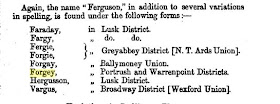
I was a little confused by the DNA matches for Roger Forgey. Most of the matches didn't share the same surname?? You would expect to find only same surname matches given the fact that the Y chromosome is only passed from fathers to sons. Well after doing some research at Family Tree DNA and elsewhere I found that these matches indicate a relationship before fixed surnames were adopted.
Not being clear about when surnames were first adopted I did some research. It seems that before 1350 many common people did not have fixed inherited surnames.The aristocracy was the first group to adopt surnames. Taxation made more precise identification necessary and was a catalyst for the development of surnames . The growth of the military and civil bureaucracy led to the standardization of surnames.
A few of the non Forgey surname matches were only two or three markers off at 37 markers. This leads me to believe that the Forgeys adopted a fixed surname relatively late. The lowlands Scots, as the Forgeys were, tended to adopt fixed surnames later than those in Southern England. They may have adopted a fixed surname in the 1400 or 1500's or even later. The first appearance of the name Ferguson (the root name of Forgey in Scotland) seems to have been on a 1466 land record (the 15th century seems to be when Ferguson was first adopted). This record transferred land from John Ferguson to his son. Ferguson appears to be a patronymic name referring to men who were sons of a Fergus. Previous to the adoption of the surname Ferguson they were referred to only as "sons of Fergus."
In the past people changed surnames for various reasons,and early names were not always carried down in families. An example apprentices sometimes took their masters surnames. Many of the earliest surnames were not inherited by descendants and died out.
 |
Varieties and synonymes of
surnames and Christian names in Ireland |
I think previous family researchers miscalculated the date of the adoption of our family name. Some felt that the Forgies came from Normandy with William the Conqueror in 1066, and the name dated from that time period. This seems unlikely. Most of those who came with William the Conqueror had surnames which related to the place they came from in France, and were preceded by "de" meaning "of". I have not found any references to de Forgies in western Scotland. Most experts on the subject agree Forgey is a variant of the surname Ferguson. As a matter of fact a couple of Fergusons were close DNA matches. So I tend to agree that at least in our line the name derives from Ferguson. It is likely that there are other origins for this surname in other places. Our family origins seemed to be rooted in Scotland; which is supported by the DNA testing. There may also be a French origin of the name? The William Forgey line which settled in Allegheny County, PA in the late 18th Century claimed French ancestry. This illustrates the difficulty which arises when trying to trace someone based solely on their surname. Surnames change over time. Similar surnames may be used in several countries.So sharing a surname does not represent proof of a blood relationship.
 |
| Progressive Men of the State of Montana Volume 2 |

 I was a little confused by the DNA matches for Roger Forgey. Most of the matches didn't share the same surname?? You would expect to find only same surname matches given the fact that the Y chromosome is only passed from fathers to sons. Well after doing some research at Family Tree DNA and elsewhere I found that these matches indicate a relationship before fixed surnames were adopted.
I was a little confused by the DNA matches for Roger Forgey. Most of the matches didn't share the same surname?? You would expect to find only same surname matches given the fact that the Y chromosome is only passed from fathers to sons. Well after doing some research at Family Tree DNA and elsewhere I found that these matches indicate a relationship before fixed surnames were adopted.

No comments:
Post a Comment